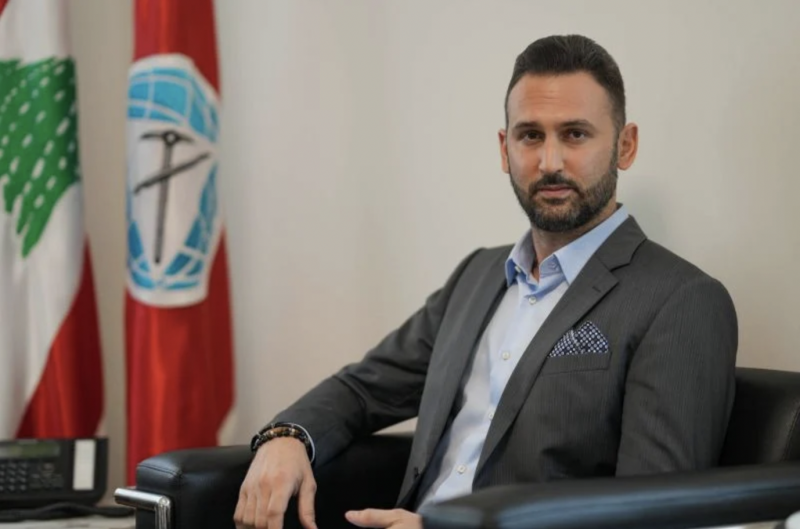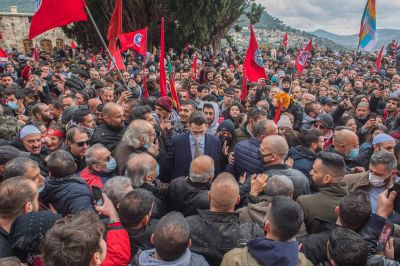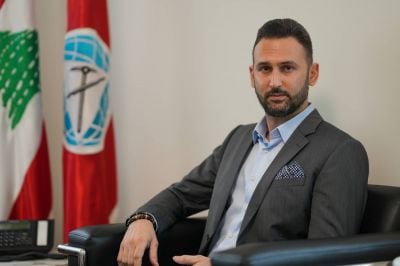
The head of the Progressive Socialist Party Taymour Joumblatt in his office in Beirut during an interview with L'Orient-Le Jour. (Credit: Mohammad Yassin)
Taymour Joumblatt officially assumed the reins of the Progressive Socialist Party (PSP) almost a month ago, but he is still keeping his usual low profile. Since his father Walid withdrew from politics, Taymour has rarely spoken out, and the Lebanese know very little about the man who could play a key role in Lebanon’s political life for years to come.
This 40-year-old politician has been enthroned at the head of the Druze community in a very sensitive context, at a time when the presidential impasse is extremely polarized and the entire Lebanese political system seems to be called into question.
In this context, the PSP position is closely watched by observers, as the party has historically played the role of kingmaker, benefiting in particular from the political elasticity of its former president, whose main concern was to protect the Mountain and the Druze minority.
But from what little is known about him, particularly from those close to him, Taymour Joumblatt could do things differently. The heir to the PSP, visibly marked by the Oct. 17, 2019 uprising said he sees Lebanon from a different angle, that of a youth driven to emigrate and thirsting for change.
In his first interview since taking office, the new PSP president spoke to L’Orient-Le Jour about the challenges ahead and his vision for Lebanon and the Druze leadership.
After your election as PSP head, you became the main leader of the Druze community. How do you intend to reconcile the figure of the modern young man with that of the sectarian zaim?
Our party’s membership includes men and women of all faiths, representing Lebanon’s whole diversity. [The PSP] is based on the principles of secularism, in other words the total separation of religion and state. It is also based on the principles of sovereignty, tolerance and social and economic justice, with all that being completely true to the thinking of Kamal Joumblatt, its founder. Having said that, it is important to know that after the Civil War [1975-90], all the parties in our country turned into sectarian parties. And while it is true that the PSP represents the majority of the Druze community, perhaps more than the other political parties, given that I am Walid Joumblatt’s son and that I am now at the head of the party, I will certainly be led to continue along this path. But that in no way means that I intend to represent only the Lebanese Druze to the detriment of their fellow citizens. My primary objective is to represent all young Lebanese men and women, in the hope of leading this country towards a better future, with a spirit of openness and tolerance.
Under your leadership, 22 years after the Mountain reconciliation, what does the future hold for relations between the PSP and the Christian parties?
Dialogue is ongoing with all the country’s political components, and in the Mountain specifically, contacts with the Christian parties are based on the reconciliation process initiated by the late Maronite Patriarch Nasrallah Sfeir and Walid Joumblatt. In this context, since my election at the party’s head, we have had several contacts with the Free Patriotic Movement [FPM] in particular. These consultations are based on mutual respect rather than trust, and for the moment remain rather superficial, as relations have faced rough patches in the past.
Admittedly, we have aligned ourselves with the FPM [and the opposition] to support the presidential candidacy of former minister Jihad Azour, but I cannot guarantee that Gebran Bassil will not give him up in the name of his own interests, especially as his links with Hezbollah seem to be improving. We continue to have differences over some issues, such as the appointment of the army chief of staff [a post reserved for a Druze]. In any case, we hope that things will move forward in the interests of the country. As for the other Christian parties, the Lebanese Forces (LF) and the Kataeb, we would also like to develop relations with them, especially since the political positions we share are many. The channels of communication are also open with the elected representatives of the uprising.
Do you have a vision for a more reformist Lebanon, in line with that of the Oct. 17 uprising?
My vision for Lebanon remains aligned with that of Kamal Joumblatt, my grandfather: a civil state based on solid institutions and the separation of religion and state. Unfortunately, the previous generation of political leaders moved away from this idea, which seems impossible at the moment, not least because the people continue to vote along sectarian lines. But the first step must be taken and the momentum will follow. In the meantime, we must preserve what remains of the institutions, of the Taif Agreement and of the state. This is also the rhetoric of the uprising, which was right to call the rulers to account but unfortunately was unable to achieve its objectives. This is partly the fault of the political class, which did everything it could to ensure that the movement failed, but the protesters also made two major mistakes: firstly, a lack of realism. The slogan “all of them means all of them” implied a radical and immediate change of the entire political class, which is impossible. Change requires many years of struggle, especially in a country like Lebanon, which is based on a sectarian balance. It also fails to take into account the challenges that the older generations have had to face and the fears they have. But even more seriously, they have not managed to put up a united front. It reminds me of the March 14 camp, when the international community supported the Lebanese who were campaigning for the withdrawal of the Syrians in 2005 and a new beginning for Lebanon, before internal differences caused the movement to break up.
Despite being established in the opposition, some analysts believe that the PSP, true to its position as kingmaker, could vote for the candidate of Amal and Hezbollah, Sleiman Frangieh, when the time comes. What are your thoughts on this?
This is not true. With all due respect, I cannot vote for Sleiman Frangieh. He certainly has many qualities, such as his honesty, making him acknowledge his “friendship” with the president of the Syrian regime, Bashar al-Assad. That’s up to him … But I have to listen to my conscience and the people I represent: the Lebanese don’t want a friend of Damascus or a figure representing the political establishment. They want a new figure who represents change. Based on this principle, we made a promise to Jihad Azour, aligning ourselves with the LF, the Kataeb and the FPM, among others. We will only move on to a possible next stage in consultation with him, as we did with the first opposition candidate, Zgharta MP Michel Moawad.
Is this the position of the entire PSP or just yours? There are reports that your father had a different view of things.
A lot of people say that there was a difference of opinion between my father and myself on the presidential election. That’s far from being the case, even if there are generational differences. I’m proud of my heritage, of my father and all that he achieved, and I know that I have a heavy responsibility, but I don’t want to be constantly compared to my predecessors, who exercised their functions in a different context. For example, Arab nationalism was an important issue for the past generations, but today we hardly hear about it anymore. Coming back to the presidential election, the whole party is on the same wavelength. The Democratic Gathering bloc will always have a single position and will not divide its votes.
You seem to have played an important role in consolidating the PSP in the opposition to Hezbollah and its weapons. Don’t you fear a confrontation?
We are in a democratic country and we have the right to be on opposing sides or to have divergent positions. Also, the dialogue between Hezbollah and the PSP has never stopped and we have been able to organize our disagreement to avoid a deadlock and resolve the crisis through the institutions, so that the people do not pay the price. Moreover, we still have friendly relations with the March 8 camp, in particular Parliament Speaker Nabih Berri, who is aware of our opposition to his candidate and who never intervenes in our voting decision. I don’t think it’s in anyone’s interest for things to go any further, particularly towards an armed confrontation.
You talk about ending the stalemate …. Today, as part of its initiative, France is proposing an inter-Lebanese dialogue. Could you take part in it?
We are in favor of dialogue, and we believe that to put an end to the current impasse, it is impossible to ignore it. But it has to be said that some parties are against it, such as the LF or the protest movement’s MPs. Therefore, even if a dialogue is proposed, the initiative will be doomed to failure because of their absence. Yet these talks could be the best way of finding a compromise candidate, since the normal mechanism, that of the democratic vote, has been set aside.
Army Chief Joseph Aoun is seen as being in the best position to be the subject of an agreement. Are you in favor of this option?
Joseph Aoun was one of those put forward by the PSP in a bid to break the presidential deadlock, alongside Jihad Azour and Salah Honein. There is therefore naturally no opposition to his candidacy, even if it faces many obstacles. Some say that his election is impossible, since it requires an amendment to the constitution [which prohibits grade 1 civil servants from acceding to the presidency less than two years after leaving the administration]. But we’ve already amended the constitution a thousand times, so that’s not the real obstacle. The real obstacle is Gebran Bassil, who is directly opposed to this candidacy.
This interview was originally published in French in L'Orient-Le Jour. Translation by Joelle El Khoury.

